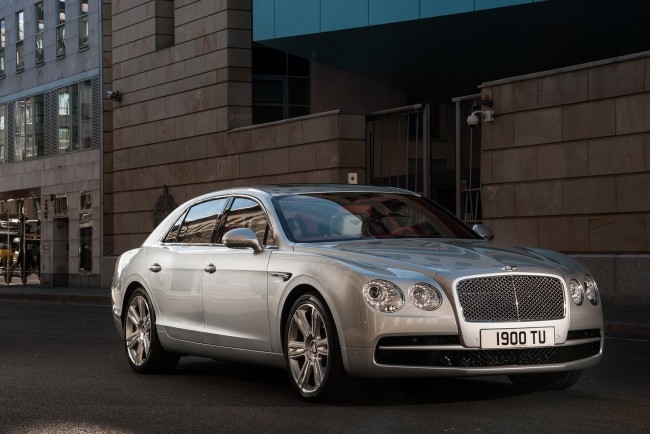Bentley, Maserati, Jeep and Hyundai are among the manufacturers behind the latest batch of recalls announced by Transport Canada.
We’ll kick off with a couple of expensive fire hazards: Bentley has recalled 469 cars from model years 2011 through 2015 to fix a loose electrical connection near the firewall that could overheat and cause a fire. Models affected include the Continental Flying Spur, Continental GT/GTC, and the Flying Spur.
From Maserati comes a recall of 40 of its Quattroporte GTS V8 sedans from the 2014 model year also have a poor wiring connection to its alternator/starter motor that could start a blaze and cause the engine to stall.
Fiat Chrysler Automobiles (FCA) has a number of recalls to report from its Jeep, Dodge and Ram brands.
One of Jeep‘s notices goes way back to a whole bunch of 2003 Liberty and 2004 Grand Cherokee models, which have a defective supplemental restraint system that could randomly set off an airbag or seatbelt pretensioner. To paraphrase Transport Canada’s notice, this could scare the crap out of the driver and lead to a crash, and cause minor injuries to vehicle occupants.
Honda will update software in more than 20,000 Accord models from 2008 to correct a similar problem: in this case, a “strong, non-vehicular collision impact to the lower body of the vehicle” or simply slamming the car door while the ignition is on could command a side airbag to deploy unnecessarily.
Another airbag-related recall comes from BMW, which says the passenger side front airbag in its Mini Cooper and BMW i3 may not deploy properly, and fail to protect that front passenger. BMW is replacing the faulty airbag assemblies in 642 cars.
In 7,500 examples of the 2015 Jeep Cherokee, a misrouted air conditioning line could contact the exhaust manifold’s heat shield, causing a loss of A/C and potentially generating smoke or fire. Dealers will inspect all affected cars and replace A/C lines where necessary.
Just over 100 Jeep Renegades have a too-long block heater cord that could rub against a front suspension coil spring, wearing off the spring’s protective coating and possibly leading to corrosion that might cause the spring to fail. Dealers will replace the heater cord, and apply rust protection to the spring.
Moving across the FCA aisle to Dodge, we find a recall to fix ABS modules in nearly 80,000 Journey crossovers that could take in water and short out.
And in more than 17,000 Ram (Dodge) 1500 pickups sold as 2015 models, incorrectly heat-treated rear-wheel axle shafts could overheat and fracture, but not before damaging nearby anti-lock brake wiring. Dealers will inspect axle shafts and replace them where necessary.
South Korea’s Hyundai is recalling close to 15,000 Elantra and Sonata models to inspect and replace front coil springs that may rust and fail, with the potential to puncture a tire. This is not new territory for Hyundai, which has issued similar recalls for past models of the Santa Fe and Accent. You’d think by 2011 they’d have figured out how to make springs reliably corrosion-resistant.
Kia, the “other” South Korean brand, is replacing shift interlock assemblies on more than 42,000 Sorento SUVs from 2011 through 2013 that could fail and let the driver shift into gear without having to apply the brakes.
Faults in four Fords have led to recalls; the first applies to the 2015 F-150 pickup, in which over-sensitive adaptive cruise control (ACC) radar sensors could trigger unnecessary emergency braking while passing a “large, highly reflective vehicle.” Transport Canada says that if this happens, the ACC system would active its usual audible and visual warnings, and the brake lights would come one, but Ford will reprogram the cruise control module in 3,400 affected trucks to correct what is an obvious safety hazard.
Thirty-nine examples of Ford’s new 2016 Explorer may have inadequately-tightened fuel tank bolts that could cause the tank to fall off the truck. Dealers will check the tank bolts and tighten them where necessary.
Another fuel-tank related fault applies to 28 Ford Fusion and Lincoln MKZ sedans. Here, improperly-made tanks could crack in a crash, leaking fuel and possibly causing a fire. Dealers will replace the fuel tanks in these cars.
The final Ford flaw applies to a handful of early Escape models (and one Mazda Tribute) from model years 2001 through 2008 that had rebuilt transmissions installed at some point in their service life. Here, a shift lever attachment bolt may be loose and leave the shifter disconnected from the transmission. Dealers will inspect the shifter assembly and tighten that bolt where necessary.
Over to Mazda next, and a recall of more than 5,300 Mazda3 models that may have faulty fuel shutoff valves that could cause a fuel leak and create a fire hazard. The fix is an inspection of fuel tank components, and installation of replacements where needed.
There are three new recalls for General Motors, one of which affects nearly 1,100 Buick Enclave, Chevrolet Traverse and GMC Acadia crossovers. These 2016 models could have defective front wiper motors prone to overheating that could melt and/or set fire to the motor’s cover. Dealers are being instructed to replace the motor cover assembly on all vehicles covered by the recall.
In 138 Chevrolet Silverado and GMC Sierra pickups, the ignition key could get stuck in the “start” position, and then rotate back to the “accessory” setting, shutting off the engine, cutting off brake and steering power assists, and (obviously) forward progress. It’s not hard to see why GM would take this one seriously; dealers are being instructed to replace the ignition lock housing in all affected trucks.
The third GM notice applies to Takata airbag inflators in 14 cars from the Cadillac XTS, and Chevy Camaro and Equinox lines. Here, the now-infamous airbag parts could fire debris into the cabin when they deploy; dealers will replace the faulty airbag modules. This is Transport Canada’s equivalent to a recall the U.S. NHTSA announced a couple of days earlier.
There are three recalls to report from Mercedes-Benz, the first applying to 369 examples of the high-po S 63 AMG sedan. Here, faulty engine control software could stall the engine as the car is slowed to a stop, which the driver could mistake for activation of the fuel-saving auto stop/start system. Dealers will update the engine control unit’s software.
Next, 269 B-, CLA- and GLA-Class cars from the 2015 model year might have improperly welded camshafts that could break and damage the engine. Transport Canada says Benz dealers will “replace the potentially-affected” camshafts.
The last Mercedes notice applies to a few 2015 S-Class Coupe models, in which the front seatbelts may have been installed left-for-right and vice-versa, affecting the effectiveness of their locking mechanisms. Dealers are inspecting the belts in these cars, and installing them properly where necessary.
Nissan Altimas from 2013 through 2016, and the 2016 Maxima are under recall to apply a better seal around the fuel gauge sending unit where it fits into the tank; ill-fitting seals installed at the factory could cause a leak if the car is involved in a crash.
Nissan and Infiniti are also recalling a couple hundred cars, including the JX35/QX60, Altima, Pathfinder and Sentra from model years 2013 through 2015 to reprogram airbag occupant classification system modules (OCSM). This actually corrects a past recall in which dealers may have installed an incorrect part when replacing OCSMs.
Nearly 3,000 Honda Pilots are being called back to dealers for updated instrument cluster software. In these 2016 models, the warning lights for stability control, ABS, and brake system warning lights may not turn on when required.
Our last recall comes from embattled Volkswagen, which is also replacing passenger airbag occupant detection sensors. Here, they could prevent proper passenger airbag deployment in a crash. In these cars, a fault would be indicated by an airbag warning light, or a “passenger airbag off” light coming on even when someone is riding shotgun.
















